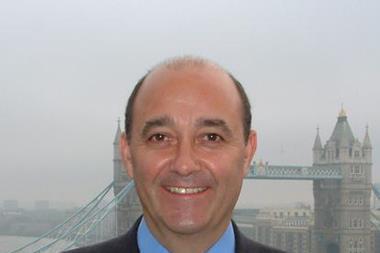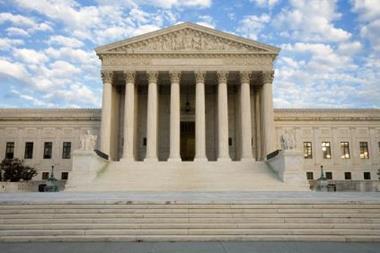Unpalatable news is rarely welcome in the boardroom – and may not be believed. Nathan Skinner interviews HBOS whistleblower Paul Moore
US President Dwight Eisenhower once said: ‘Never confuse honest dissent with disloyal subversion.’ Dissent is difficult. For risk managers it constitutes a real dilemma. On the one hand it is their responsibility to tell their bosses what they need to hear. Sometimes, however, opposing views are ignored, overruled, or worse silenced, because they are confused with disloyalty. Nowhere is this more clearly demonstrated than in the story of Paul Moore, the HBOS whistleblower.
HBOS was the British bank that had to be saved by a government backed rescue bid in October last year after its exposure to the credit crisis got too big. Moore, who was the bank’s head of risk, claims he saw the problems coming years earlier, but because his loyal dissent was confused for subversion he was sacked. For three years Moore was silenced by a gagging clause with his former employer. But when HBOS had to be rescued he made the brave decision to speak out. His explosive story sparked a media storm which sent shockwaves through Britain’s financial centre and seat of government. Never before had an insider at such a high level spilt the beans on a major corporate scandal. The accusations led to the resignation of Sir James Crosby, the deputy head of the Financial Services Authority (FSA), and forced the government to rethink a major investigation into the causes of the crisis.
One month after the dust had settled StrategicRISK visited Moore at his Yorkshire bolthole. We found Moore frustrated that the main protagonists of last year’s banking crisis are still not being held to account and convinced that a clique of powerful vested interests is determined to hide the truth. He accuses the government and regulator, the FSA, of withholding vital evidence from a proper investigation and raises fundamental questions about corporate governance and the role and responsibilities of a risk manager.
A barrister by profession, Moore is an analytical and technically minded person with a confidence bordering on extroversion—he met his wife hang-gliding in Chile - and sharp mind. He is also a committed Catholic. We sat down in the kitchen of his cottage home and he ran through the story.
Concerns about controls
Moore joined HBOS in 2002 to head regulatory risk. As far back as 2003 the regulator was worried about HBOS’ internal risk controls. Crosby, then head of HBOS, asked Moore to investigate. ‘I said I would on the condition they recognise that I was going to have to dig up the bodies.’
In particular Moore raised worries about the potential for the bank’s sales staff to mis-sell consumer investment products and payment protection insurance. This resulted in ‘a material percentage of clients not understanding the risks’, in the products they were buying. As he reported about reckless lending at the bank he was severely reprimanded by his bosses. Eventually, as more and more bodies were unearthed, Crosby fired him.
Moore was devastated. He remembers standing outside the HBOS building in London and ringing his wife to tell her the news. She said to him: ‘Don’t worry, Paul, it is God’s plan.’
In an alleged breach of their duties as directors, the board replaced Moore with a sales manager who ‘never had any experience of risk management’. This lack of respect for risk management frameworks was the fundamental cause of the banking crisis, he claims.
“I knew there was going to be a fall but I never believed it was going to be this bad.
After he was fired, in November 2004, Moore complained to the non-executive directors as well as the regulator, and demanded an independent investigation. He claims to have been severely let down by the non-executives, who didn’t offer him the support or protection that he needed. HBOS answered by commissioning an ‘independent’ auditor, KPMG, to investigate his allegations. The bank reached a quick settlement. Moore reportedly received a six figure sum for his silence. When the settlement was finalised he was taking some time out sailing in Majorca. ‘At that stage I was thinking, shouldn’t we do something else, this is completely wrong, this is a scandal. These people should be held to account for what they’ve done.’ But Moore’s lawyer advised him that he’d done everything he could by telling the regulator and the non-executives. ‘He told me to look after my family and move on.
‘I felt I had done my duty. I had followed the protocols for blowing the whistle and all that had happened is I’d been totally and utterly let down,’ he says, sipping a cup of strong coffee.
But with a powerful coalition of forces rallied against him, Moore’s conscience remained torn. His strong faith dictated some serious soul searching and he began to question himself. ‘I felt schizophrenic,’ he says. ‘I was in two minds all the time about the money.
‘It was a hard personal thing to go through. For many months afterwards I would lie awake at night remembering sentences in emails I had written and think I’ve got to get that into the evidence.’
Engaging his analytical skills, Moore began to compile his evidence and built a case against HBOS. ‘As I put the evidence together I felt very confident that what I’d done was right and what they’d done was wrong.’
When the financial crisis reached a head in 2008 Moore looked on with a hint of ‘I told you so’. Luckily by that point he’d sold almost all of his HBOS shares and told his friends to do the same. ‘I knew there was going to be a fall but I never believed it was going to be this bad.’
Then came the collapse and forced rescue of HBOS by Lloyd’s TSB. Did he feel a tiny sense of relief when it all came crashing down? ‘I’m a human being so feelings of satisfaction are a natural thing, but actually I don’t believe in revenge or gloating over people’s misery. But yes, in a sense it confirmed why I’d done what I’d done.’
Speaking out
He contacted a BBC journalist and decided to break his silence irrespective of the gagging order he’d been slapped with by his former employer. In television interviews across the country Moore gave his testimony. He accused senior HBOS management of fostering a sales-focused culture with little concern for the risks associated with it. He added that there had been an inadequate separation and balance of power between the executive and all those accountable for overseeing their actions and reining them in. ‘I felt like a man in a rowing boat trying to slow down an oil tanker,’ was his, now famous, sound-bite.
“None of my allegations have been fully investigated because none of the relevant parties has been cross examined by reference to my more detailed evidence.
A great sense of relief rushed over him. ‘I thought maybe I am supposed to be an instrument of witness.’ As 2008 drew to a close Moore knew there was more he had to do.
On 4 February he rang the Treasury Select Committee, a parliamentary inquiry which had been set up in 2008 to investigate the banking crisis. ‘I told them I had some evidence which I thought might be important.’ Fearing an injunction from HBOS, Moore was pleased when the clerk of the Committee offered him parliamentary privilege on the grounds his evidence was in the public interest. ‘That was a godsend’, he says with a smile.
He wrote 5,000 words of evidence in a day and sent it to the clerk of the Committee. No one knew Moore's evidence was going to be presented because the clerk feared the MPs would leak it. For three quarters of an hour HBOS executives were quizzed with reference to the incendiary evidence. ‘It was extraordinary,’ grins Moore. ‘They simply weren’t ready for it.’
The next day Crosby denied all of the allegations but resigned as deputy chairman of the FSA. The regulator released a statement dismissing Moore’s allegations and saying that they had been ‘taken seriously, and were properly and professionally investigated’. The British Prime Minister Gordon Brown said: ‘The allegations made by Mr Moore were found not to be substantiated.’ Furious, Moore felt he had to respond and he rubbished the KPMG report saying it would ‘not bear up to any proper independent scrutiny’.
In an effort to further prove his allegations and protect his reputation, Moore felt compelled to pass on a detailed 30 page dossier of evidence against HBOS which he’d carefully compiled over the years. He would like lawmakers to use this to inform a new regulatory policy for the financial services industry—one that will offer more support to risk managers. ‘My evidence demonstrates what the new regulatory policy should be on governance, risk management and compliance,’ he says.
Two days after the first hearing, Moore phoned the Committee clerk again and said he was ready to send in his detailed evidence. He was told to wait until HBOS and the FSA had sent their evidence in. After weeks of delays Moore became concerned that his detailed evidence wouldn’t ever get used to interview the FSA. He told the clerk that he suspected a conspiracy. Two hours before the FSA was due to be interviewed by the Committee Moore received a call asking for his evidence. By that stage there was no time for the MPs to digest the information. ‘My evidence arrived just too late for it to be used to interview the FSA. How very convenient for them!’
Frustration continues
He remains disappointed with the progress of the investigation so far. ‘None of my allegations have been fully investigated by the Treasury Select Committee because none of the relevant parties has been cross examined by reference to my more detailed evidence.’ Moore has called on the government to accept his allegations as true and refer Crosby, the FSA, Dennis Stevenson, the former chairman of HBOS, Andy Hornby, Crosby’s successor, and other key executives and non executives at HBOS, to the relevant authorities. The only way to achieve this is with a broad ranging commission of inquiry, he says. ‘I don’t think we will ever really know how to reconstruct the system until we do that.’ Having spoken with some of Britain’s top political leaders he is not optimistic about the prospect of a full inquiry. ‘There is no appetite to do an investigation because the great and the good are all implicated in this.’
Moore is clearly frustrated that the auditors, HBOS and the FSA are, in his view, not being held to account. ‘Had they put their hands up and said “sorry we’ve done something wrong”, that would have been the end of it. They have not. They have all denied the truth of what I’ve said. So that means unfortunately that they are going to be put to the test.’ He is personally considering legal action against Lloyd’s TSB, the new owners of HBOS, for failing in their duty of care to investigate ‘probable wrongdoing’ by the previous directors. And he has not ruled out issuing a complaint to the Institute of Chartered Accountants relating to the KPMG report.
If there is a lesson for risk managers in all of this it is that to be successful they need support. A culture of openness and transparency is also essential so that they feel comfortable bringing issues to the attention of the board. Speaking truth to power is a form of loyalty. It is one of the best ways to make sure an organisation lives up to its potential. Moore will keep on fighting for his evidence to be heard. In the meantime, the financial services industry can learn a valuable lesson – and risk managers have a new hero.
Postscript
Nathan Skinner is associate editor, StrategicRISK



















